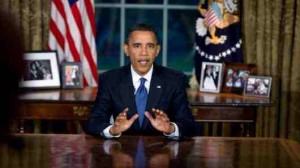The arc of the MSM is at once predictable and satisfying, especially when it comes to the liberal media’s slowly dawning realization that the Obamessiah ain’t all they cracked him up to be. First, a willful decision to opt for fantasy over reality, then denials, then the most modest of criticisms (delivered more in sorrow than in anger), then the who-cares turn of the worm, then outright hostility, then the acceptance of defeat… and finally, Jimmy Carter-like, rehabilitation and reassement.

In the “Being There” presidency of Barack Obama, we have now arrived somewhere between step 4 and step 5, the part of the movie where the media, having been treated like cheap slatterns, drabs and courtesans, wakes up one morning face down in the gutter and realizes she’s no good. Not yet ready to start regaining her lost dignity, she blames herself for the misfortune than has befallen her lover — she’s not worthy!
The occasion for these reflections is the disastrous Oval Office, empty-desk speech made by the president manque the other night as he attempted to convince the nation that he is, in fact, in charge of something other than his malevolent shredding of a Constitution he obviously so clearly despises. It was a speech panned by nearly everybody (except the reliably ridiculous Paul Begala, a man who gives the word “toady” a bad name), made all the more risible by the ludicrous sight of Obama sitting behind the empty Resolute desk, like a ’60s college radical who’s briefly occupying the president’s study. From a thumb-sucker by Adam Nagourney in the New York Times:
On blogs, on a blur of cable news shows, on magazine Web sites, in the morning newspapers, the verdict within 12 hours was nearly unanimous: Mr. Obama’s speech on Tuesday night about the oil spill had been pedantic, vague and uninspiring — a lost opportunity.
“It’s the first Obama speech ever panned by the talking heads,” Mike Allen reported in the Politico Playbook.
But so what? Does it really matter if you lose the pundits anymore?
Sure — what do they matter? The Times and other major newspapers employ people like Maureen Down and Frank Rich and Paul Krugman precisely because nobody gives a fig about their opinions of current events!

And, while we’re at it, let’s blame bloggers:
There was a time when the after-action takes of big commentators were sought out by Americans trying to assess the latest news coming out of the capital. They helped drive public opinion.
But tracking influences on public opinion has become greatly complicated now that the once-exclusive club has been joined by the vast multitudes blogging or posting Twitter updates or otherwise opining online, with a select few doing so after offering instant analysis on television. Mr. Obama had barely begun his speech when various commentators began a running review on Twitter.
It is not just the number of commentators or the abundance of platforms that is diluting the influence of the mainstream media, but their speed. Opinions are being served up so fast that in this case many of them were stale by the next morning.
“Things have expanded so much,” Dennis Ryerson, the editor of The Indianapolis Star, said on Thursday. “Forty years ago, newspapers ran opinion pieces by a lot of columnists, most of whom were in Washington. They had a good following and were widely respected. But now anyone with a cheap computer can become a columnist or a pundit. The definition has changed. More people are in the game right now.
And better people in many cases as well. The gatekeeper media is done; even the Times can no longer drive the agenda the way it used to. In the old days, news wasn’t news until the paper said it was news, after which its lead would dutifully be followed by the Washington Post, the three networks and the two major newsweeklies.
But them days is gone — the Times‘s website is both heavily trafficked and informative, but the power of its opinion columnists has largely dissipated, except among the die-hard dead-enders of West End Avenue in Manhattan. A series of recent news events (the Helen Thomas story comes to mind) have originated and played themselves out in cyberspace, and the first time the print readers knew about the story was after it was over.
And so it is with their columnists — opinions that are both irrelevant and out of date the moment they hit the subscribers’ doorsteps. Opinions so irrelevant, in fact, that not even the Times takes them seriously any more.
So why should we?
COMMENTS
Please let us know if you're having issues with commenting.